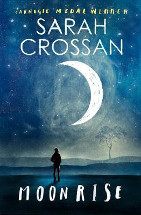Moonrise by Sarah Crossan

Bloomsbury, 2017. ISBN 9781408878439
(Age: Senior secondary - Adult) In this stunning new work, an
extended lyrical work reminiscent of 17th century lyrical poetry,
Sarah Crossan plummets the reader into the lives of one family and
the outcome that looms for one member. As she leads us into the
complex, violent, dramatic and immensely sad lives of the family, we
are drawn deeply into the events of the past that have led to this
point. The story is discomforting, its tale alternating between love
and neglect, loyalty and rejection. Here we have a family that did
not nurture the children, where there is violence, and the parents
seem to have been careless of the wellbeing of their children. One
of the children is to be executed for his crime, of manslaughter,
and his sister is determined to offer him love and understanding.
Harsh and deeply moving, the reality that Crossan presents becomes
discomfortingly comprehensible both in the crime and the punishment.
Told in its bare essentials through a gentle, poetic structure, this
narrative offers us the shocking contrast of neglect and love in one
family, and disturbs us with a harsh state response that is
unforgiving. It is constructed in an unusual manner for a story
placed clearly in the modern world of narrative literature, the
story told as an extended poem. Crossan, in her creation of warmth
and in her deft handling of the angst felt by the family, uses the
bareness of this poetic narration to draw us into the family's
disturbing past and present.
Captivating and powerful, Crossan's work tells nothing outside of
the events and interactions that are crucial to the narrative, yet
the emotions, the drama and the characters are evoked in a
surprisingly lyrical manner. Unexpectedly, as we are drawn into the
world of the text, Crossan builds a feeling of calm, elicited in the
delicate brushstrokes that paint the love of one sibling for
another, in its bare details. This extended poem, in its gentle
tone, is clearly quite at odds with the brutality described and the
violent punishment that is about to occur, yet it is difficult to
ignore her unwritten plea for forgiveness and understanding, for
clemency and non-violent punishment. It is apt for adults, suitable
for older adolescents, but its topic difficult to understand and
disturbing in reality for younger adolescents.
Elizabeth Bondar